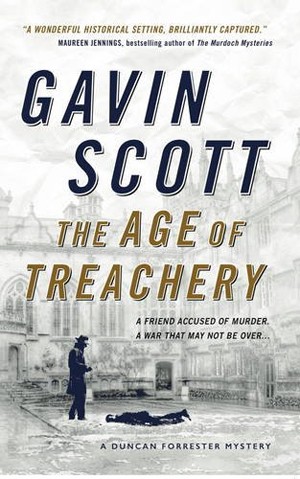
Historical settings are always popular in crime fiction, and one of the richest in terms of intrigue is the post-World War II period. Whole societies went through cataclysmic changes, and a new order arose from the rubble. In Britain, the victorious Churchill was swept from power by the new Labour government and plans began for a National Health Service. Internationally, the Western allies tried to comprehend and combat Communism.
Into this combustible mix is thrown Duncan Forrester, a damaged ex-Special Operations Executive agent and now junior studying ancient history at Oxford. He joins a gathering one evening to listen to a reading from a Viking saga. Other dons are there, and scholars from around the world, as well as a member of the Foreign Office and a rising German politician. The reading is interrupted by a loud crash in the courtyard where David Lyall lies dead. Apparently he fell from the rooms of another academic, Gordon Clark. Clark and Lyall were rivals, not just for a prestigious fellowship, but also personally. Lyall was reportedly having an affair with Clark’s wife. Clark becomes the chief suspect in the murder inquiry and has no alibi.
Author Gavin Scott swiftly establishes a range of suspects, all of whom were present during the recital. If Forrester is to prove his friend’s innocence, he will not only have to discover the identity of the murderer, but also explain to the sceptical constabulary how the murder was committed. There were no footprints surrounding the corpse as it lay in the winter snow.
Forrester’s entry point for his investigation is the rumour that Lyall had discovered a long lost Nordic saga, but questions remain. Where is it now? What made it worth killing over? And if Lyall had the saga, why didn’t he share it with the college Masters, who include the famous CS Lewis and JRR Tolkien?
Incidentally, Scott proves a dab hand at weaving famous figures into his story for interest and colour. Ian Fleming appears as a magazine editor for The Times; theatre critic and impresario Kenneth Tynan plays a pivotal role in solving the mystery; even the grocer’s daughter from Grantham, Margaret Roberts, has a brief cameo. Scott is careful not to overdo things though, and never descends into novelty.
News of Forrester’s investigation reaches his old boss at the SOE who arranges for him to travel to Berlin. There he can investigate links between Lyall, who undertook commando operations during the War, and the rising German politician Peter Dorfmann. The intelligence services have some questions about just how clean his past really is. Over there, Scott paints a contrasting portrait of the society that lost World War II, one that shares none of the cautious optimism felt in Britain. Political intrigue deepens the mystery of Lyall’s murder, and the stakes are raised for Forrester as an attempt is made on his life. We see another side to him now, as the dedicated friend and diligent investigator gives way to the trained ruthless agent.
As a character, Forrester’s main strength is as a decent Everyman. Scott is careful to make him likeable, a reliable and trustworthy friend who did his duty, paid a terrible price doing so, and rose from humble beginnings as a trawler man’s son to the gleaming spires of Oxford. A minor quibble would be that while there are hints that Forrester has some class resentment, this is never really explored. I would have preferred him to have some rougher edges.
The story finale is faithful to traditional mysteries of the past, with a gathering together of suspects and an ingenious resolution. Indeed, Scott shows a familiarity with mystery structure. With an engaging protagonist, a clever puzzle, and post-war intrigue and even some romance, has produced an exciting historical thriller. I can’t escape the thought that it would make a terrific television drama, and I am pleased to hear that there are at least two more Forrester novels in the pipeline.
If you enjoy this you will also like Anthony Price’s series of cold war espionage thrillers such as The Labyrinth Makers, featured during Classics in September 2013. In a four-minute clip below, Gavin Scott explains his inspiration for the book.
Titan Books
Print/Kindle/iBook
£3.79
CFL Rating: 5 Stars









